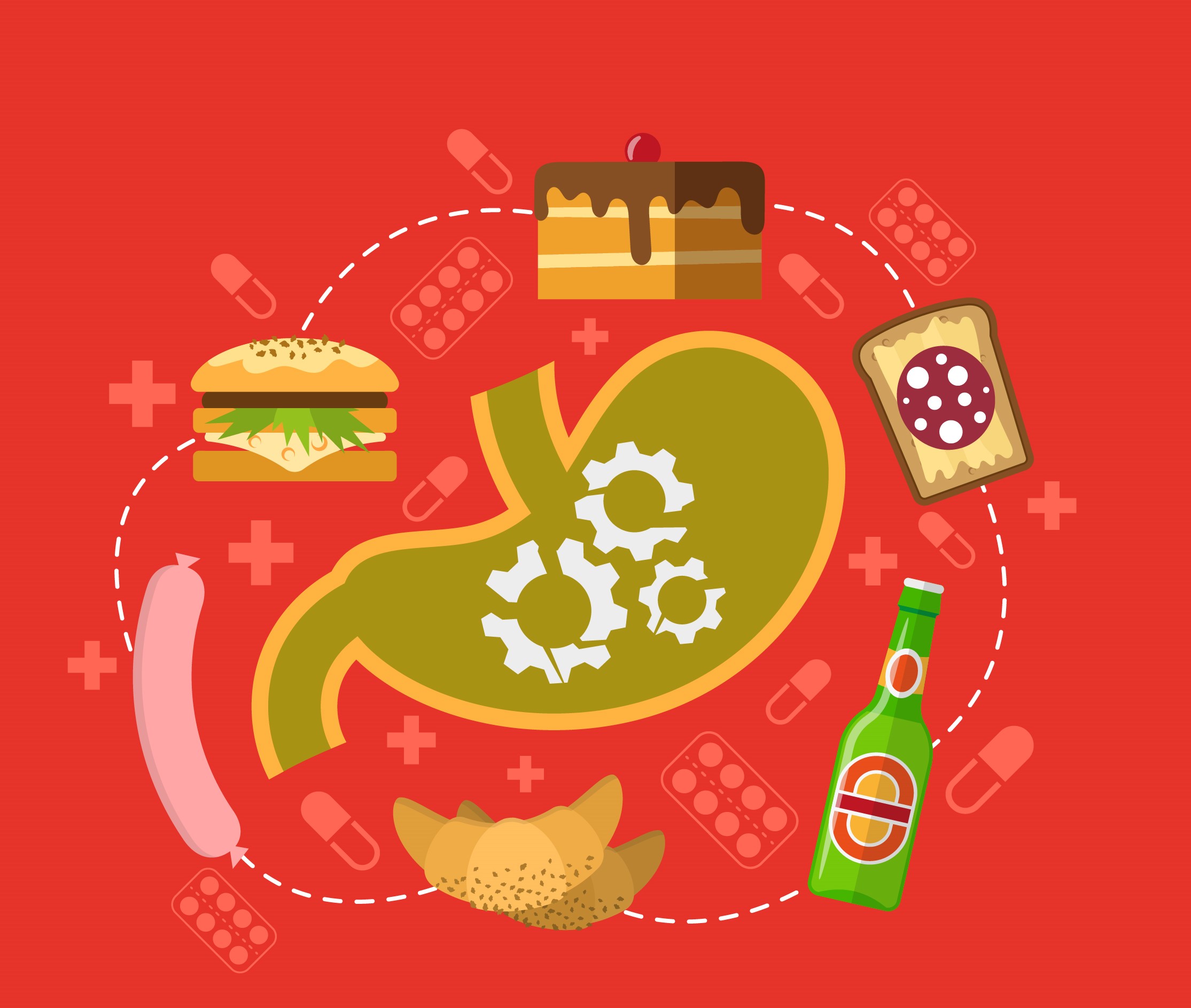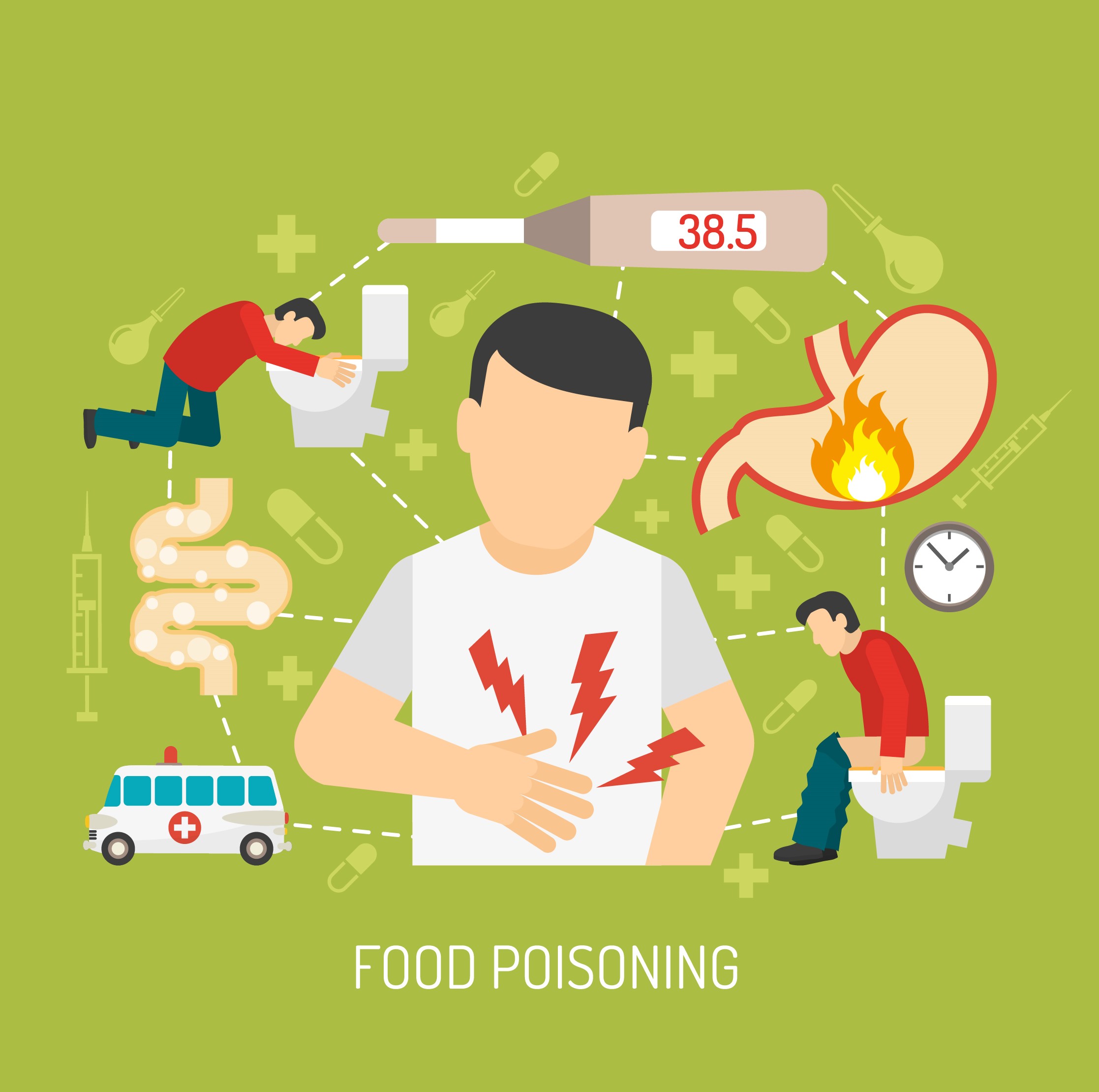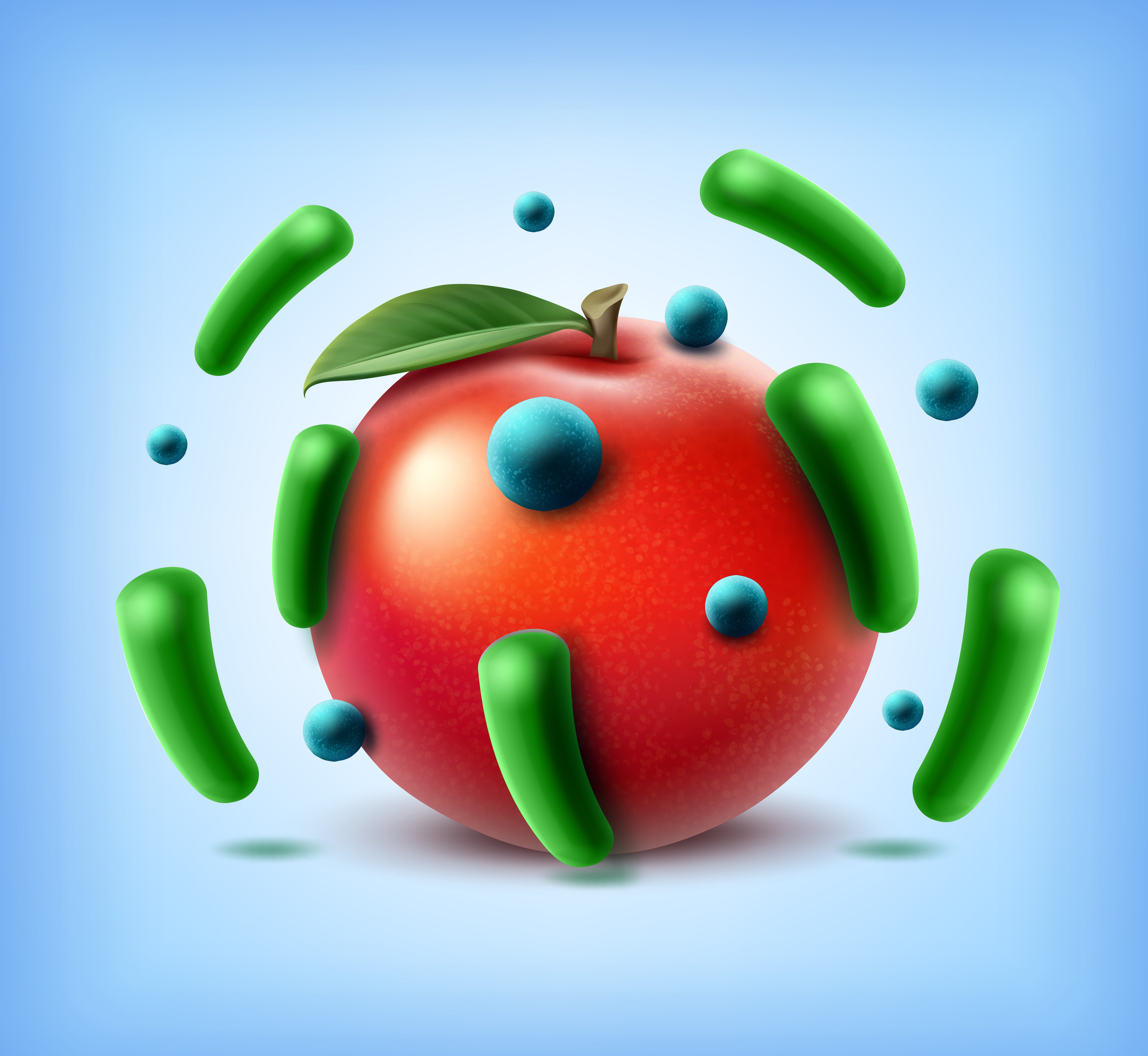Nutrition, especially adequate and balanced nutrition, is important and necessary in sustaining life and protecting health. Safe food consumption is an issue that needs to be emphasized. Foods, which are the basic ingredients of our lives, can become harmful and pose a hidden danger to our health due to insufficient hygienic conditions during the stages from purchasing to consumption. Bacteria and their toxins (poisons), which threaten our health and are the cause of many food-borne poisonings, find a suitable environment for reproduction, especially with the increase in temperatures, and the incidence of food-borne poisoning increases in summer. In the summer, where environmental and hygienic conditions are not good, classical factors can cause widespread infections and cause diarrhea, seriously threatening public health, on the other hand, unhealthy food storage, mistakes in food preparation and cooking can cause food-borne diseases to become widespread.
Food poisoning; Although they are mostly mild and short-term diseases, foods that cause poisoning and can cause the disease to progress more severely from time to time and even to be fatal. Anyone can get food-borne illnesses, but some people are more susceptible. These are infants, children, pregnant women, the elderly and people with weakened immune systems.
Food poisoning is the general name given to the infection or intoxication that occurs as a result of the consumption of any food or beverage. Food infections are food poisoning caused by consuming food in which harmful bacteria grow. On the other hand food intoxication is food poisoning caused by ingestion of toxic food produced by some bacteria that produce toxins (poison).
What are the factors that lead to food-borne diseases/poisoning?
Chemicals, natural food toxins, metals, pesticides, detergents, plastics, parasites and microorganisms (bacteria, mold and yeast) can cause food-borne diseases/food poisoning.

Metal contamination of food may occur due to the dissolution of toxic substances from tools that are not suitable for food storage. Storing acidic foods in containers containing copper or lead in their composition or keeping foods in tin-free copper containers can also lead to heavy metal poisoning. For this reason, foods should not be kept in tin-free copper, painted plastic and aluminum containers. The pesticides used to increase the yield in agricultural products can also contaminate the nutrients due to ignorance and faulty practices. Some foods naturally contain toxic compounds called “toxins”. For example, some types of mushrooms, mad hone and sprouted green potatoes… They can cause food poisoning due to the natural toxic substances they contain in their structures. Among microorganisms, especially bacteria are the main culprits of many food-borne diseases. Bacteria, that reproduces in foods that are generally, prepared and cooked in unsuitable hygienic conditions cause food poisoning.
What are the symptoms of food poisoning?
Food poisoning usually starts suddenly and symptoms can appear between 30 minutes and 72 hours after consuming contaminated food. In addition to complaints related to the digestive system such as diarrhea, nausea, vomiting, severe abdominal pain and abdominal cramps, fever can sometimes be seen. The reaction of individuals after eating contaminated food varies according to the bacteria or toxin, how contaminated the food is, the amount consumed and the sensitivity of the individual to the bacteria. While some individuals do not have any symptoms after consuming the same contaminated food, some individuals may experience very severe symptoms.
 What should we do if suspect food poisoning?
What should we do if suspect food poisoning?
• Vomiting and diarrhea are the body's reactions to the toxin. For this reason, anti-nausea and anti-diarrheal drugs should not be used within 24 hours of the onset of complaints.
• It is a wrong behavior not to eat anything with the thought that it will increase diarrhea and vomiting. The best form of diarrhea treatment is to rest and consume plenty of fluids (clean drinking water, mineral water, unsweetened tea, etc.).
• Foods such as yoghurt, rice porridge, boiled potatoes should be consumed until diarrhea subsides, raw vegetables that increase intestinal motility, fruits such as plums, apricots, grapes, watermelons should not be consumed.
• Fruits should be consumed after being thoroughly washed and peeled.
When should a doctor be consulted?
* If you have bloody diarrhea,
* If you have neck stiffness, severe headache or fever with diarrhea,
* If the symptoms of poisoning continue for more than two days, a physician should be consulted immediately.
What are the ways of transmission?
Bacteria absolutely need agents to contaminate food. These agents are humans, animals, and insects. Bacteria can be transmitted to foods through a patient or carrier, as well as in a way called "cross-contamination". Cross contamination is bacterial contamination of a clean food from non-nutrient and bacteria-containing agents. Non-nutrient factors causing cross contamination; hands, tools, chopping boards, kitchen counters, cloths and sponges used in the kitchen, clothes, droplets from coughing and sneezing, any surface that has been in contact with liquids that are contaminated with bacteria or leaking from potentially risky foods.
Salmonella, a bacterial agent that can cause food poisoning, is found in the intestines of many farm and poultry animals, including birds. Therefore, raw or undercooked chicken, meat, eggs, fish and unpasteurized milk are good sources for the reproduction of salmonella. Street milk is risky for Salmonella because it is not pasteurized.
Ways of protection from food poisoning caused by Salmonella;
√ Purchasing meat and meat products from reliable places,
√ Not buying eggs that are broken, cracked or contaminated with feces,
√ Washing the egg just before use,
√ Using different knives and chopping boards while preparing raw and cooked meats,
√ Storing the cured meats in the refrigerator, covered, until they are cooked,
√ While cooking food, care should be taken to ensure that the cooking temperature reaches the temperature (65˚C and above) where bacteria can die,
√ Frequent stirring while cooking the food in deep pots, ensuring a balanced distribution of the temperature throughout the food,
√ Washing hands with hot soapy water after handling raw meat, eggs and poultry,
√ Thoroughly washing and disinfecting all tools and surfaces with hot water and detergent after each use,
√ Washing hands with soap and water after using the toilet is an important preventive measure.
Treatment of food poisoning
Most food poisonings go away on their own. However, if it does not go away, it may be sufficient to replace the fluid and electrolyte losses lost with diarrhea and vomiting. In cases where it is not sufficient, antimicrobial treatment may be required after blood tests and stool examination.
The following recommendations can be made to individuals regarding food poisoning:

• Never let the food you cook and consume later to cool at room temperature on the counter or stove for more than two hours.
• Do not keep cooked food at room temperature for more than one hour in summer when air temperatures increase.
• Never use frozen food in a heater, stove, etc. Do not dissolve on it. Remember; the most suitable thawing methods for frozen foods are to thaw them at refrigerator temperature, in their original packaging, under running water or in a microwave oven.
• Do not use unpasteurized milk and dairy products.
• Wash vegetables and fruits thoroughly under plenty of running water.
• Make sure that the food made from minced meat is thoroughly cooked.
• Obtain your drinking water from reliable sources, boil it if you are not sure of its reliability, or use chlorine tablets that you can buy from pharmacies in accordance with the instructions for use.
• When purchasing frozen foods, make sure that the cold chain is not broken. Do not buy with ice crystals inside or under the packaging.
• Especially store frozen foods in their original packages at -18˚C and below.
• Defrost frozen food properly. Do not refreeze thawed food
• When purchasing canned food, do not buy the ones with swollen upper and lower lids, damaged boxes and loose lids, broken or cracked ones. In canned food, the fact that the upper and lower lids are swollen and curved is an indication of the growth of bacteria.
• It is not recommended to make canned food at home, considering that it will be hygienically inconvenient. If you are canning at home, carefully follow the principles of canning (in home canning; in canning of foods with high acidity (such as fruits and tomatoes); boil half-pound jars and cans for 15 minutes, and kilos for 20 minutes. Cooking low-acid foods (vegetables, meat, etc.) .) boil these foods at 115ºC for 20-25 minutes).
• Follow personal hygiene rules in the preparation, cooking and serving of food.
• Do not taste the food with the utensils used to mix the food. Use a separate tool.
• To ensure personal hygiene; wash your hands frequently and properly.
• Keep your nails short and clean. Do not use nail polish, wedding rings and jewelry while handling food.
• If there is wounds, bruises, cuts, etc. on the hands; cover the injured part with a waterproof bandage while preparing food.
• Do not touch your hands to body surfaces while handling food and drink.
• Never store dry foods such as grains and legumes in a humid and hot environment.
• Make meals containing rice in quantities to be consumed daily and do not reheat more than once if reheating is in question.
• When purchasing all kinds of foodstuffs, the label information should be read, the production and expiry date, whether there is a production permit and storage conditions should be observed.
• Consumption of food sold outdoors should be avoided, especially in summer.
• Cloths, handles and sponges used are the best tools for transporting microbes from one place to another. For this reason, cloths should be disinfected after each use and should not be left wet and wrung.
Reference
Food Poisoning, Causes and Ways of Prevention. Ministry of Health, Directorate of Primary Health Care Services, February 2008/ANKARA



 What should we do if suspect food poisoning?
What should we do if suspect food poisoning?